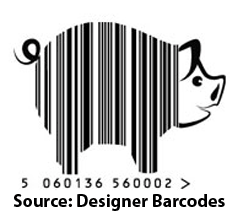Below are SCDigest's picks for the top stories in recent weeks on RFID, automatic data collection and IoT. It's actually not easy to find news on these topics in supply chain applications, but we do our best.
Wisconsin Company Expanding Roster of RFID-Implanters
SCDigest has reported a couple of times on the RFID-implant program at Three Square Market, a technology company that provides self-service mini-markets to hospitals, hotels, and company break rooms.
Last August, roughly 50 employees at the company's headquarters in River Falls, WI volunteered to have an RFID chip injected into their hand, with a tag about the size of a grain of rice injected between the thumb and forefinger.
Supply Chain Digest Says... |
 |
| Nick Anderson, an associate professor in public health sciences at the University of California, Davis, says the privacy and security of any information stored on the chips is an obvious concern - except, that's not how it works. |
. |
What do you say? |
| Click here to send us your comments |
 |
| Click here to see reader feedback |
|
|
The tags make it easier for employees to do things like get into the office, log on to computers, and buy food and drinks in the company cafeteria - all literally with the wave of a hand.
The system uses passive RFID implants, meaning just like EPC tags in retail they do not have batteries, using power from an RFID reader when it "interrogates" a chip.
A year into the program, how is it going?
The MIT Technology Review recently got an update from the company, and let's just say, so far so good.
Employees say they are still using the chips regularly at work for all the activities they started out with last summer. Since then, an additional 30 employees have elected for the implants, which means that roughly 80 of the company's now 250 employees have become "transhuman," to use a phrase some have applied to such marriage of the body and technology.
Conversely, just two Three Square Market employees have had their chips removed - and that was when they left the company.
MIT reports that Sam Bengtson, a software engineer, uses his chip 10 to 15 times a day. At this point, swiping his hand over an RFID reader plugged into his computer is no different from typing in his password on a keyboard, he says.
The company is also exploring some ways to use microchips outside the body, running tests a hospital in Fort Wayne, IN and another in Hudson, WI - that will verify when doctors and nurses wash their hands. They'll wear bracelets incorporating a chip that they can scan on an RFID reader to turn on a sink.
But then, even MIT gets it wrong, as have so many others when it comes to RFID.
The Technology Review cites Nick Anderson, an associate professor in public health sciences at the University of California, Davis, as saying the privacy and security of any information stored on the chips is an obvious concern.
It adds that the information gathered by readers could give lots of details about employees' comings and goings, and someone could in theory ping your chip with a reader to find out what's on it.
But of course…. That's not how it works.
Data about "comings and goings" is not stored on the chip. Similar to the EPC tags in retail, we assume the tags implanted in Three Square Market employees carry only a simple ID number, which the various software systems at the company use to verify the employee and what services are allowed/consumed.
(See More Below)
|
CATEGORY SPONSOR: SOFTEON |
|
|
| |
|
|
Any data mainatined about an employee's activity would be stored in computer databases, not on the chip, which likely has little memory at all.
But the MIT article does end on a better note.
It notes there is also the chance - and it seems certain to happen eventually - that the technology inside the employees' bodies will become outdated. Employee Bengtson, at least, has some concerns about this.
"There may need to be a - dare I say - upgrade program, or something like that," he says.
Invisible Bar Codes on Meat Could be Used to Validate Integrity
An "invisible bar code" that can be sprayed onto joints of meat and scanned by consumers using a smartphone will thwart future food fraud, scientists have claimed.
According to an article in the UK's Telegraph newspaper and web site, accounting firm Pricewaterhouse Coopers (PWC) is developing an edible signature with an agent used in spices and powdered milk that promises to enable potential tracking how the animal was raised, what it ate and where it was processed.
 The new electronic etching procedure is due to be launched in Australia and China within the next 12 months. The new electronic etching procedure is due to be launched in Australia and China within the next 12 months.
Once in wide scale use, the technology should help regulators and shoppers avoid food fraud such as the amazing horse meat scandal which rocked the British food industry in 2013, in which what was supposedly beef sold in a number of UK grocery stores turned out actually to be horse.
The PwC procedure begins at the processing plants, where meat is sprayed with fine particles of silicon dioxide.
This can create a distinctive pattern which is capable of being recognized by a hyper-spectrum laser gun, which shines a light onto the microparticles and reads back a unique wavelength, similar to a regular bar code scan.
The tagging and reads could be done at every stage of the meat production process, potentially enabling individual steaks or other cuts of meat to be identifiable.
Initially, however, the micro-tag will be embedded into meat's primary packaging only.
To be used directly on meat, PWC must obtain regulatory approval to use the silicon, which is used now as an anti-caking agents in some food stuffs, to be used for tracking and serialization. Every steak could then have its own invisible license plate number.
RFID Enables Industrie 4.0, ARC Analyst Says
Writing on the web site of analyst firm ARC, Byflorian Güldner says with the collapse of the Walmart RFID program around 2008-09, interest in RFID dropped off significantly.
Now he says, RFID technology has neen reignited by the fervor of Industrie 4.0 and the IIoT in manufacturing.
 As a result, he says, ARC now forecasts double-digit growth in terms of units for RFID in manufacturing. RFID was identified as enabling technology towards achieving the goals set out by Industrie 4.0/IIoT. As a result, he says, ARC now forecasts double-digit growth in terms of units for RFID in manufacturing. RFID was identified as enabling technology towards achieving the goals set out by Industrie 4.0/IIoT.
"In 2017 the market grew at almost double digit and we expect the growth in 2018 to be even higher," Güldner wrote. "While Western Europe and Japan already have a good installed base of RFID readers and the markets are mature, North America and China are now catching up. While North America has a good RFID penetration in the supply chain and logistics area, the usage in manufacturing is still behind Western Europe."
Güldner adds that in addition to the adoption of RFID for basic manufacturing applications, including track & trace, product and material flow, intralogistics, asset management, etc. there are new applications rising, which promise to push the market further. These include IP protection, smart maintenance, or even RFID used within sensing solutions. This also means that there is a deeper integration into ERP, MES, PAM, and the control layer.
"RFID turns out to become a more generic technology and suppliers and users are just starting to unlock the complete potential," Güldner writes.
Güldner adds he expects the number of RFID system vendors to stay constant or even increase. Technical barriers are low and application know-how becomes more important, so new companies from other areas may step in.
"Overall, the RFID in manufacturing market is facing interesting times," Güldner concludes.
Any Feedback on this week's top stories? Let us know your thoughts at the Feedback section below.
Your Comments/Feedback
|